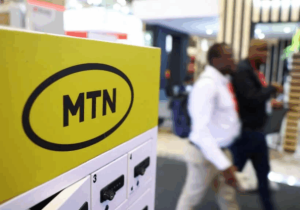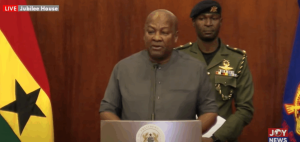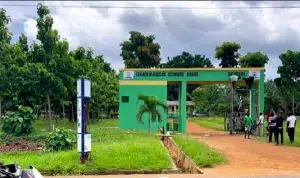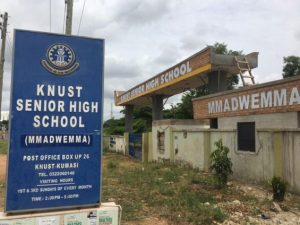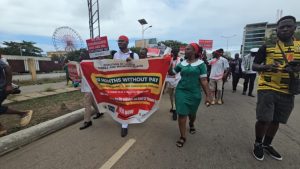GRA Boss: Goods Clearance at Ports Unhindered by Ghana Card Dispute

The Commissioner-General of the Ghana Revenue Authority (GRA) has refuted allegations that current disputes with the National Identification Authority (NIA) regarding purported debts have hindered the clearance of goods at the ports.
Anthony Kwasi Sarpong, in an interview on Joy News’ PM Express Business Edition on Thursday, August 21, stated that claims indicating importers are unable to clear their goods due to the Ghana Card issue are “not a true representation.”
“What also came out was the negative or the incorrect news to say that because NIA has taken that action, people cannot clear their stations.
“As you speak right now, it is not an accurate account. If you look at the tax administration system today, we have the individuals, which we are using the Ghana Card, and businesses which GRA generates by itself. Most of these importers run on business TIN.
“We don’t rely on Ghana Card. And therefore it couldn’t have been that if you don’t have your Ghana Card at use, you cannot import.”

Mr. Sarpong assured importers that port operations remain unaffected.
“So I want to use this medium to assure all importers that one, that is not the situation. We have not had any single complaint from any importer.
“The general public should be assured that that is not the situation. And then we are also working with NIA to resolve the matter.”
He explained that the Ghana Card is not continuously validated for existing taxpayers and therefore cannot disrupt the clearing process.
“Indeed, once your Ghana Card is once validated and in your system, it’s not something we validate all the time. So if you are already in our system, you are not impacted.
“It is only needed when a new taxpayer offices and they show their Ghana Card, then we go to NIA and say, somebody has showed their Ghana Card, is it issued by you?
“And therefore, for existing taxpayers, both corporate and individuals, this matter is not having any impact at all. And therefore that’s why, as we say, it was inaccurate, the post that was out.”
In response to the broader conflict, Mr. Sarpong recognized the existence of longstanding agreements between the two organizations, but emphasized that the issue is currently being addressed at the leadership level.
“Before 2025 there was some form of legacy arrangement between the NIA and GRA. Part of it was for NIA to say that as GRA receives the data, some amount has to be paid to NIA.
“But the other part was also that GRA made available all its offices nationwide for NIA to operate. So as we speak today, NIA has offices all in GRA offices for which GRA does not pay, for which NIA does not pay anything to GRA. But these arrangements were not conclusive.”
He revealed that he had already held discussions with the NIA Director-General to resolve the issue amicably and expressed disappointment that the matter was taken to the media.
“As far as the demand for debt is concerned, when I took over, I have from leadership perspective engaged the Director-General of NIA. We met here in GRA offices, and we discussed the matter, and we agreed that as leaders, we need to look at the issues and resolve them subsequently.
“I’ve also had a conversation with them, how what GRA believes the matter should be, and how they should. So for us as GRA, it came as a matter of surprise.
“That’s something that we are speaking on as legacy, as leaders we came to meet, we have opened the door and accepted them to discuss further and resolve, so it was a huge surprise to hear our sister agency trying to take the matter to the media and solve it there.”
He insisted that government agencies must avoid destabilising public service delivery.
“It’s important to recognize that when you have problems, you cannot solve it all in the media. It’s a matter that we need to sit, to dialogue, to discuss in a spirit of collaborative manner and solve it.
“So you will notice that from GRA perspective, we have extended another professional arm to our sister agency to say, look, let’s sit down. We know there are issues in this area. We don’t fully agree with your sessions and claims, but we are prepared to lead a way to discuss and to resolve the matter.
“So we’ve extended a hand to them to lead and resolve. I believe that that is what leadership is for, and the two of us are government institutions to serve the people. Our actions should not lead to destabilizing service to the people or disturbing our core mandate.
“So we are committed to work with NIA, and we call upon them to extend, take on the hand that we have extended, and let us resolve the matter and deal with it.”



